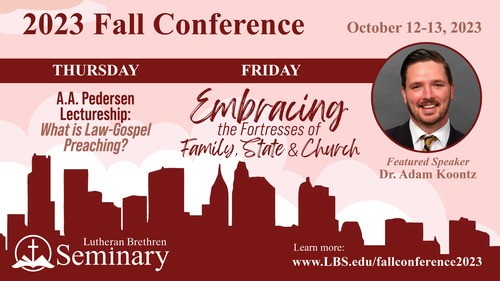The Biblical Family and the Church

If Satan’s fiercest warfare on our people over the past half-century had been made directly on one of the Church’s doctrines, we might have been better prepared. When there was dissension over the doctrine of Scripture, many churches upheld the inerrancy of the Bible right away and strongly. When there was and is confusion about the ordination of women, many churches have steadfastly maintained that Scripture teaches a male pastorate exclusively. However, since the attacks much more often and much more frequently have been against the family, we were less prepared. These attacks have come through a multitude of channels.
Compared to our grandparents’ families, our families today form later, struggle more to stay together, and split up more frequently. We struggle not only in those areas but also to make a living on two incomes. Our grandparents almost all lived on one income. Our families are perhaps smaller than our grandparents’ families and certainly than our great-grandparents’ families, yet our children seem to cost more to raise, and they want more things during their raising than our grandparents could have afforded. We now struggle ourselves, or have friends who are struggling, to keep their children in the Church. For some, it’s a struggle to accept their own God-created bodies. Surely a plague is in our midst, like the locusts came upon Israel of old (Joel 2:25). This chaos slips into our churches in ways too many to count, and the confusion and sadness bleeds into our interactions with our family and with our congregation.
How could all of this happen? When the Lord teaches on the family and on divorce, he commands that man should not separate what God has joined together (Matthew 19:6, Mark. 10:9). Man and wife should not be put away from each other because God has made the two into one flesh (Genesis 2:24). A divorce is like a death; a life made by God has ended through the wages of sin. Divorce was common enough in that day that the Lord’s own teaching sounds impossibly hard to his disciples (Matthew 19:10). How could he expect people to stay together? Because he draws his teaching not from how hard our hearts may be apart from his Word, but from what he intended from the beginning.
The family predates the fall into sin. God brought Eve to Adam before the serpent brought temptation to Eve. God blessed their union and gave the pattern of every wedding since that day: the two shall become one flesh. From that one flesh should come fruit according to his blessing, that people should fill the earth and subdue it (Genesis 1:28). That blessing is still in effect: children are identified as a blessing throughout Holy Scripture (from only one book, see Psalm 113:9, 127:3, 128:3, 6). Children serve as the Lord’s example for faith and entry into his kingdom (Mark. 10:14) because within the family they live by another’s care and love as we the children of God live by the Father’s care for us. The family and its life of blessing serve as the pattern for the Church’s life together.
So when the family and its life of blessing are taken apart, the Church suffers, too. When we do not know a loving father, we have trouble knowing the Father above. When we think of children as a problem for our families, we will think of them, and thus of the future, as a problem for our churches. The family’s health is the Church’s concern, and the family’s flourishing in Christ is the Church’s special joy.
What to do? Go back to the beginning, back to what God established, and start anew from there. There is no cause for misery in repentance, only a sadness that we did not turn back sooner to the Lord and to his ways. And there is every cause for joy in repentance, just as the angels rejoice who know the glories and the peace ahead for the penitent sinner.
God established a union of one man and one woman at the family’s heart. Make every effort for children to marry well—in the Christian faith and with the blessing of their parents. Marriage affects the whole family, so the wisdom of elders is key in recognizing and blessing two people who will spend the rest of their lives together. That life’s foundation will be the Word of God, so the couple must use God’s Word in their daily lives, letting it dwell richly in their midst that it might shed its light on all things in their lives.
God established a union that has children who need their father’s care and their mother’s love. Make every effort to welcome many children into the home and for the home to be a place of security and peace for them. The children can be educated in the family or in a school at the family’s discretion, but the home must be the center of its life, not the school or the softball team or anything else. Being a “homemaker” is a full-time job and must be treated as such (Titus 2:5). It is worth every penny of sacrifice for a family. In that home children find a place for themselves in the midst of the joys and sacrifices that prepares them better than any education or schooling could for what life will bring.
God established the family from the beginning as a blessing. Put other things aside so that the family can be blessed with God’s Word each day and with his delights of grace every Sunday. In his ways—even from the beginning—are fullness of peace and fullness of joy.
Compared to our grandparents’ families, our families today form later, struggle more to stay together, and split up more frequently. We struggle not only in those areas but also to make a living on two incomes. Our grandparents almost all lived on one income. Our families are perhaps smaller than our grandparents’ families and certainly than our great-grandparents’ families, yet our children seem to cost more to raise, and they want more things during their raising than our grandparents could have afforded. We now struggle ourselves, or have friends who are struggling, to keep their children in the Church. For some, it’s a struggle to accept their own God-created bodies. Surely a plague is in our midst, like the locusts came upon Israel of old (Joel 2:25). This chaos slips into our churches in ways too many to count, and the confusion and sadness bleeds into our interactions with our family and with our congregation.
How could all of this happen? When the Lord teaches on the family and on divorce, he commands that man should not separate what God has joined together (Matthew 19:6, Mark. 10:9). Man and wife should not be put away from each other because God has made the two into one flesh (Genesis 2:24). A divorce is like a death; a life made by God has ended through the wages of sin. Divorce was common enough in that day that the Lord’s own teaching sounds impossibly hard to his disciples (Matthew 19:10). How could he expect people to stay together? Because he draws his teaching not from how hard our hearts may be apart from his Word, but from what he intended from the beginning.
The family predates the fall into sin. God brought Eve to Adam before the serpent brought temptation to Eve. God blessed their union and gave the pattern of every wedding since that day: the two shall become one flesh. From that one flesh should come fruit according to his blessing, that people should fill the earth and subdue it (Genesis 1:28). That blessing is still in effect: children are identified as a blessing throughout Holy Scripture (from only one book, see Psalm 113:9, 127:3, 128:3, 6). Children serve as the Lord’s example for faith and entry into his kingdom (Mark. 10:14) because within the family they live by another’s care and love as we the children of God live by the Father’s care for us. The family and its life of blessing serve as the pattern for the Church’s life together.
So when the family and its life of blessing are taken apart, the Church suffers, too. When we do not know a loving father, we have trouble knowing the Father above. When we think of children as a problem for our families, we will think of them, and thus of the future, as a problem for our churches. The family’s health is the Church’s concern, and the family’s flourishing in Christ is the Church’s special joy.
What to do? Go back to the beginning, back to what God established, and start anew from there. There is no cause for misery in repentance, only a sadness that we did not turn back sooner to the Lord and to his ways. And there is every cause for joy in repentance, just as the angels rejoice who know the glories and the peace ahead for the penitent sinner.
God established a union of one man and one woman at the family’s heart. Make every effort for children to marry well—in the Christian faith and with the blessing of their parents. Marriage affects the whole family, so the wisdom of elders is key in recognizing and blessing two people who will spend the rest of their lives together. That life’s foundation will be the Word of God, so the couple must use God’s Word in their daily lives, letting it dwell richly in their midst that it might shed its light on all things in their lives.
God established a union that has children who need their father’s care and their mother’s love. Make every effort to welcome many children into the home and for the home to be a place of security and peace for them. The children can be educated in the family or in a school at the family’s discretion, but the home must be the center of its life, not the school or the softball team or anything else. Being a “homemaker” is a full-time job and must be treated as such (Titus 2:5). It is worth every penny of sacrifice for a family. In that home children find a place for themselves in the midst of the joys and sacrifices that prepares them better than any education or schooling could for what life will bring.
God established the family from the beginning as a blessing. Put other things aside so that the family can be blessed with God’s Word each day and with his delights of grace every Sunday. In his ways—even from the beginning—are fullness of peace and fullness of joy.
Rev. Dr. Adam C. Koontz serves as Pastor at Trinity Lutheran Church in Denver, Colorado.
Dr. Adam Koontz will be presenting at Lutheran Brethren Seminary's 2023 Fall Conference on October 12-13, 2023. Register: www.lbs.edu/event/fallconference2023

